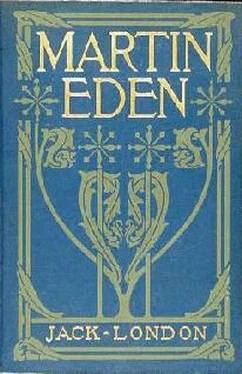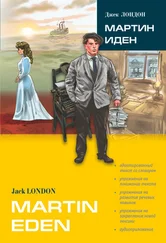Martin Eden
by Jack London
The one opened the door with a latch-key and went in, followed by a young fellow who awkwardly removed his cap. He wore rough clothes that smacked of the sea, and he was manifestly out of place in the spacious hall in which he found himself. He did not know what to do with his cap, and was stuffing it into his coat pocket when the other took it from him. The act was done quietly and naturally, and the awkward young fellow appreciated it. "He understands," was his thought. "He’ll see me through all right."
He walked at the other’s heels with a swing to his shoulders, and his legs spread unwittingly, as if the level floors were tilting up and sinking down to the heave and lunge of the sea. The wide rooms seemed too narrow for his rolling gait, and to himself he was in terror lest his broad shoulders should collide with the doorways or sweep the bric-a-brac from the low mantel. He recoiled from side to side between the various objects and multiplied the hazards that in reality lodged only in his mind. Between a grand piano and a centre-table piled high with books was space for a half a dozen to walk abreast, yet he essayed it with trepidation. His heavy arms hung loosely at his sides. He did not know what to do with those arms and hands, and when, to his excited vision, one arm seemed liable to brush against the books on the table, he lurched away like a frightened horse, barely missing the piano stool. He watched the easy walk of the other in front of him, and for the first time realized that his walk was different from that of other men. He experienced a momentary pang of shame that he should walk so uncouthly. The sweat burst through the skin of his forehead in tiny beads, and he paused and mopped his bronzed face with his handkerchief.
"Hold on, Arthur, my boy," he said, attempting to mask his anxiety with facetious utterance. "This is too much all at once for yours truly. Give me a chance to get my nerve. You know I didn’t want to come, an’ I guess your fam’ly ain’t hankerin’ to see me neither."
"That’s all right," was the reassuring answer. "You mustn’t be frightened at us. We’re just homely people-Hello, there’s a letter for me."
He stepped back to the table, tore open the envelope, and began to read, giving the stranger an opportunity to recover himself. And the stranger understood and appreciated. His was the gift of sympathy, understanding; and beneath his alarmed exterior that sympathetic process went on. He mopped his forehead dry and glanced about him with a controlled face, though in the eyes there was an expression such as wild animals betray when they fear the trap. He was surrounded by the unknown, apprehensive of what might happen, ignorant of what he should do, aware that he walked and bore himself awkwardly, fearful that every attribute and power of him was similarly afflicted. He was keenly sensitive, hopelessly self-conscious, and the amused glance that the other stole privily at him over the top of the letter burned into him like a dagger-thrust. He saw the glance, but he gave no sign, for among the things he had learned was discipline. Also, that dagger-thrust went to his pride. He cursed himself for having come, and at the same time resolved that, happen what would, having come, he would carry it through. The lines of his face hardened, and into his eyes came a fighting light. He looked about more unconcernedly, sharply observant, every detail of the pretty interior registering itself on his brain. His eyes were wide apart; nothing in their field of vision escaped; and as they drank in the beauty before them the fighting light died out and a warm glow took its place. He was responsive to beauty, and here was cause to respond.
An oil painting caught and held him. A heavy surf thundered and burst over an outjutting rock; lowering storm-clouds covered the sky; and, outside the line of surf, a pilot-schooner, close-hauled, heeled over till every detail of her deck was visible, was surging along against a stormy sunset sky. There was beauty, and it drew him irresistibly. He forgot his awkward walk and came closer to the painting, very close. The beauty faded out of the canvas. His face expressed his bepuzzlement. He stared at what seemed a careless daub of paint, then stepped away. Immediately all the beauty flashed back into the canvas. "A trick picture," was his thought, as he dismissed it, though in the midst of the multitudinous impressions he was receiving he found time to feel a prod of indignation that so much beauty should be sacrificed to make a trick. He did not know painting. He had been brought up on chromos and lithographs that were always definite and sharp, near or far. He had seen oil paintings, it was true, in the show windows of shops, but the glass of the windows had prevented his eager eyes from approaching too near.
He glanced around at his friend reading the letter and saw the books on the table. Into his eyes leaped a wistfulness and a yearning as promptly as the yearning leaps into the eyes of a starving man at sight of food. An impulsive stride, with one lurch to right and left of the shoulders, brought him to the table, where he began affectionately handling the books. He glanced at the titles and the authors’ names, read fragments of text, caressing the volumes with his eyes and hands, and, once, recognized a book he had read. For the rest, they were strange books and strange authors. He chanced upon a volume of Swinburne and began reading steadily, forgetful of where he was, his face glowing. Twice he closed the book on his forefinger to look at the name of the author. Swinburne! he would remember that name. That fellow had eyes, and he had certainly seen color and flashing light. But who was Swinburne? Was he dead a hundred years or so, like most of the poets? Or was he alive still, and writing? He turned to the title-page… yes, he had written other books; well, he would go to the free library the first thing in the morning and try to get hold of some of Swinburne’s stuff. He went back to the text and lost himself. He did not notice that a young woman had entered the room. The first he knew was when he heard Arthur’s voice saying:-
"Ruth, this is Mr. Eden."
The book was closed on his forefinger, and before he turned he was thrilling to the first new impression, which was not of the girl, but of her brother’s words. Under that muscled body of his he was a mass of quivering sensibilities. At the slightest impact of the outside world upon his consciousness, his thoughts, sympathies, and emotions leapt and played like lambent flame. He was extraordinarily receptive and responsive, while his imagination, pitched high, was ever at work establishing relations of likeness and difference. "Mr. Eden," was what he had thrilled to-he who had been called "Eden," or "Martin Eden," or just "Martin," all his life. And " Mister !" It was certainly going some, was his internal comment. His mind seemed to turn, on the instant, into a vast camera obscura, and he saw arrayed around his consciousness endless pictures from his life, of stoke-holes and forecastles, camps and beaches, jails and boozing-kens, fever-hospitals and slum streets, wherein the thread of association was the fashion in which he had been addressed in those various situations.
And then he turned and saw the girl. The phantasmagoria of his brain vanished at sight of her. She was a pale, ethereal creature, with wide, spiritual blue eyes and a wealth of golden hair. He did not know how she was dressed, except that the dress was as wonderful as she. He likened her to a pale gold flower upon a slender stem. No, she was a spirit, a divinity, a goddess; such sublimated beauty was not of the earth. Or perhaps the books were right, and there were many such as she in the upper walks of life.
Читать дальше












